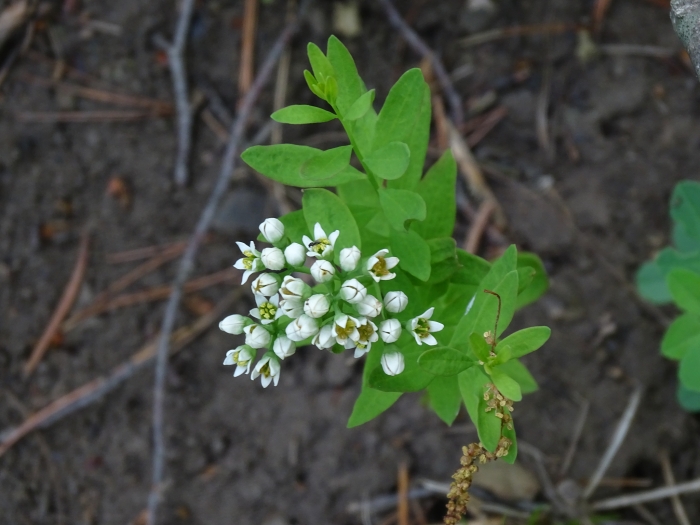Bastard Toadflax
(Comandra umbellata)
Bastard Toadflax (Comandra umbellata)
/
/

Reuven Martin
Public Domain
Image By:
Reuven Martin
Recorded By:
Copyright:
Public Domain
Copyright Notice:
Photo by: Reuven Martin | License Type: Public Domain | License URL: http://creativecommons.org/publicdomain/zero/1.0/ | Rights Holder: Reuven Martin | Publisher: iNaturalist | Date Created: 2020-05-29T07:21:30-07:00 |




















































Estimated Native Range
Summary
Comandra umbellata, commonly known as Bastard Toadflax, is a perennial herb that is native to a variety of habitats including open woodlands, grasslands, and prairies across North America. It typically grows from rhizomes to a height of 8 to 34 centimeters (3+1⁄4 to 13+1⁄2 inches). The plant has a somewhat woody base and features narrow, lance-shaped leaves up to 3.3 cm long, arranged alternately along the stem. Bastard Toadflax blooms from April to June, producing flat or roundish clusters of small, inconspicuous flowers. These flowers are unique in that they lack true petals but have five greenish-white sepals that may appear petal-like. The flowers are perfect, containing both male and female structures, and are typically pollinated by insects. Following pollination, the plant produces a small, olive-shaped drupe 4–6 mm thick.
Bastard Toadflax is valued for its ability to thrive in poor soils and its use in xeriscaping due to its low water requirements. It is often used in native plant gardens, rock gardens, and restoration projects where its drought tolerance and ability to spread make it a practical ground cover. In cultivation, it prefers full sun to part shade and is adaptable to various soil types, provided they have medium drainage. While not known for aggressive roots or serious disease problems, it can spread somewhat vigorously through its rhizomes, which should be considered when planting near other garden plants.CC BY-SA 4.0
Bastard Toadflax is valued for its ability to thrive in poor soils and its use in xeriscaping due to its low water requirements. It is often used in native plant gardens, rock gardens, and restoration projects where its drought tolerance and ability to spread make it a practical ground cover. In cultivation, it prefers full sun to part shade and is adaptable to various soil types, provided they have medium drainage. While not known for aggressive roots or serious disease problems, it can spread somewhat vigorously through its rhizomes, which should be considered when planting near other garden plants.CC BY-SA 4.0
Plant Description
- Plant Type: Subshrub, Herb
- Height: 0.3-1 feet
- Width: 0.3-1 feet
- Growth Rate: Moderate
- Flower Color: Green
- Flowering Season: Spring, Summer
- Leaf Retention: Deciduous
Growth Requirements
- Sun: Full Sun, Part Shade
- Water: Low, Medium
- Drainage: Medium
Common Uses
Butterfly Garden, Edible*Disclaimer: Easyscape's listed plant edibility is for informational use. Always verify the safety and proper identification of any plant before consumption., Low Maintenance
Natural Habitat
Open woodlands, grasslands, and prairies across North America
Other Names
Common Names: Umbellate Bastard Toadflax, Common Comandra, Common Comandra, Comandre De Richards, Comandre En Ombelle, Comandre À Ombelle
Scientific Names: , Comandra umbellata, Comandra umbellata var. decumbens, Thesium elegans, Comandra umbellata var. lanceolata,
GBIF Accepted Name: Comandra umbellata (L.) Nutt.